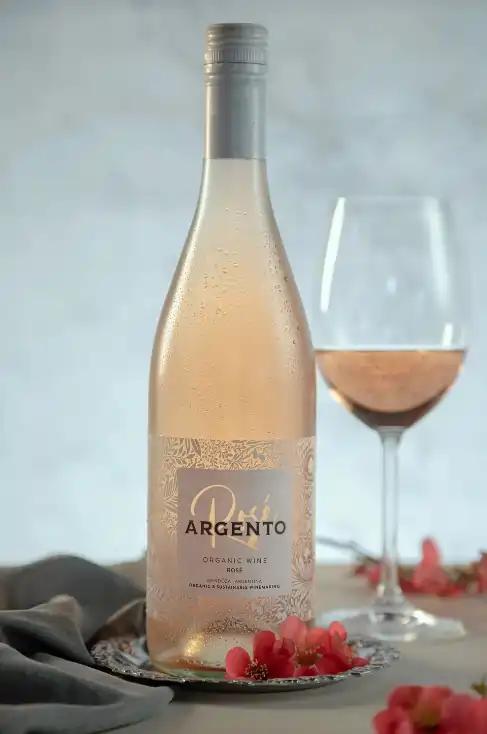Fabricio Portelli recommends three labels made with certified organic grapes, a trend that continues to grow hand in hand with the consumer’s greater concern for sustainability.
As a product of the earth and of great added value, wine is perceived as a natural beverage, since it is the result of the total or partial fermentation of grape juice, although there is a chemical product used in enology; sulfur dioxide (SO2), which serves as an antioxidant agent in wine. But, the better the quality, the doses are almost imperceptible. However, some time ago, some markets began to demand “sulfite-free wines”, something impossible because all wines naturally contain a proportion of these sulfur derivatives.
That is why today there are “natural wines”, which are those to which no sulfites are added. Obviously, like organic wines, they must come from organically managed vineyards, i.e. where no pesticides or herbicides are used to cure. Something that in Argentina is a growing trend in most vineyards because, favored by a desert climate environment, they are very healthy naturally. In other words, if wine is a quite natural beverage, Argentine wine is a bit more so.
There is another category that starts with organic grapes; biodynamic wines, which are made respecting the lunar calendar, both in the vineyard and in the winery. A philosophy that does not imply better quality, but respecting a concept. That is to say that organic wine is very broad, but it has not yet been demonstrated that an organic wine is of better quality than one made with grapes from vineyards that are not certified as such.
Here, the most important thing to take into account is quality. Although all wines are born in the vineyard, only the best quality ones seek to reflect the place, with the least possible intervention. And for this to happen, the quality of the grapes must be the best. Many opt for organic management, but without certification, so as not to share the prestige of the place with the concept.
Others, on the other hand, go all out, promoting certifications as a way of guaranteeing that the wines are made with grapes from vineyards that do not use chemical synthesis products. Although this is a growing trend, it is still a minority of the world’s wine supply, and Argentina (as an important producer) is no exception.
For the first time in its history, in 2022 the National Institute of Viticulture (INV) began to collect data on the entry of organic grapes and must in the country. And in its first report it shows not only the growth of organic vineyards, but also the strong market demand for this type of wine, both locally and abroad. This indicates that organic wines are not a fad, but a trend that is growing steadily over the years.
For example, there are currently 142 registered establishments with organic grape production in Argentina. And although the final data for the current harvest are not yet available, in 2022 a total of 706,171 quintals of organic grapes were harvested. Mendoza received 60.9% of that total, La Rioja 18.6% and San Juan 17.9%. In summary, Argentina’s organic vineyards account for 4.4% of the total cultivated in the country. In terms of varieties, the largest volume of organic grapes entering establishments corresponds to Malbec (30.1%), followed by Cherry grapes (14.7%).
Then follow three white varieties: Torrontés Riojano (9.5%), Chardonnay (5.5%) and Pedro Giménez (5%). It should be noted that, in Argentina, wine is the second exported organic product of vegetable origin, after cane sugar. In 2021, 11.1 million liters of organic wine, 2.4 million liters of organic must concentrate and 887 tons of organic raisins were exported.
Comparing these values with those of the previous year, exports of organic must increased by 146% and those of organic wine by 6.4%. And in the last 10 years, organic wine exports increased by 85.6%. The largest volume of organic wine products exported went to the United States, mainly must concentrate. In terms of organic wine, the main importer of certified Argentine wines is Denmark (21%), followed by Sweden (19%), the United Kingdom (13%) and Germany (9%).
For all those who like to delve into the world of organic wine, the ninth edition of the Organic and Sustainable Wines Fair will be held from Friday August 4 to Saturday August 5, a meeting that brings together the most sustainable wines in the country, from certified organic and biodynamic wines, to natural and Fair Trade wines.
The event will be held at Botica del Ángel, from 7 to 11 pm. In addition to access to talks on enology and sustainability, the entrance includes free wine tasting and full access to the house-museum created by Eduardo Bergara Leumann, which pays tribute to Argentine art in all its expressions.
1- Argento Organic Rosé 2022
Argento Winery, Luján de Cuyo, Mendoza $1800
The young Juan Pablo Murgia (Avinea Group Winemaking Manager) is one of the makers of the most organic wines in the country, and has been for several years. Here he presents his new rosé, made from Malbec (65%), Pinot Grigio (20%) and Syrah (15%).
Fragrant and agile, fresh and with good volume, friendly and frank, to enjoy at the beginning of a good meal.
Points: 89

Organic wines are the starting point for thinking about sustainability
2- Fin Del Mundo Organic Vineyards Red Blend 2021
Bodega Del Fin del Mundo Winery, San Patricio del Chañar, Neuquén $3500
After four years of work on the road to organic farming (first organic vineyard of 40 hectares certified by LETIS S.A. in 2022), this Red Blend of Malbec (55%), Cabernet Sauvignon (25%) and Merlot (20%) arrives.
With freshness and fluidity, easy to drink for its balance, but also with the power of the place. It has a ripe fruit character and a lingering finish. Drink between 2023 and 2024.
Points: 90
3- Altitud Organic Malbec 2022
Andeluna, Gualtallary, Valle de Uco $4520
Since 2017 the winery started on the road to sustainability and it is amply reflected in this brand new Malbec, made from grapes that obtained ECOCERT organic vineyard certification. It is a juicy and expressive red, with an agile palate and consistent textures. Winemaker Manuel González Bals manages to show the winery’s environment in a sharper way. Drink between 2023 and 2025.
Points: 90.5

